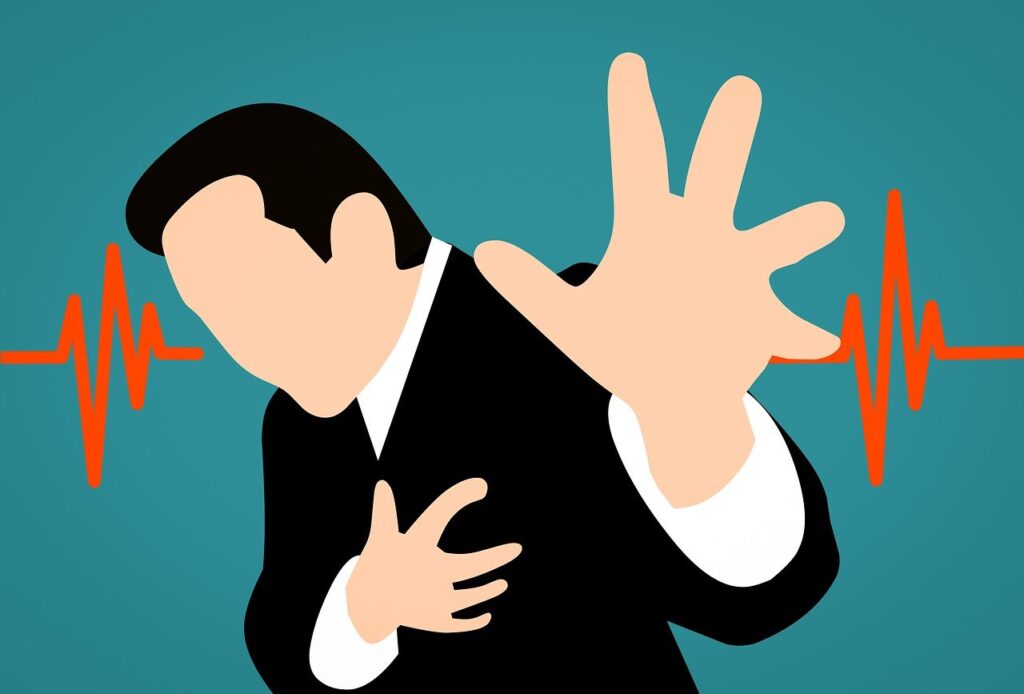Pericarditis chest pain can be alarming. But what is pericardium? The pericardium is a thin, two-layered sac filled with fluid. It covers the outer surface of the heart. The heart is housed within the chest wall and is protected from infection and cancer by pericardium. Additionally, when blood volume rises, it keeps the heart from overexpanding, maintaining its efficiency. In a short while, I will explore various aspects of pericarditis chest pain, including its symptoms, causes, duration, and most effective treatments.
What is Pericarditis Chest Pain?
Pericarditis chest pain is the inflammation of your pericardium, the thin sac-like membrane surrounding your heart. Chest pain is one of the primary symptoms associated with pericarditis.
Symptoms of Pericarditis Chest Pain
- Sharp and Stabbing Pain: Chest pain from pericarditis is frequently characterized as intense, sharp, or stabbing. Usually, it happens on the left or center side of your chest.
- Exacerbation of Breathing and Movement: When you are breathing deeply, coughing, or bending forward, you may exacerbate your chest pain. This is one of the hallmarks of pericarditis.
- Radiation to the Back: It might radiate between your shoulder blades, toward your back. Pericarditis chest pain can be distinguished from other forms of chest pain by this symptom.
- Pain Relieved by Sitting Up and Leaning Forward: Sitting up and leaning forward, or adopting the “tripod” position, is a common way to relieve pericarditis chest pain.
What Causes Pericarditis?
- Viral Infections: In most cases, pericarditis chest pain is caused by viral infections, such as the common cold.
- Bacterial or Fungal Infections: Less commonly, bacteria or fungi can cause you to have pericarditis.
- Autoimmune Diseases: Conditions like lupus or rheumatoid arthritis can lead you to have pericarditis.
- Heart Attacks: Pericarditis can be a complication of a heart attack.
What Makes Pericarditis Worse?
Several factors and conditions can worsen pericarditis chest pain or exacerbate its symptoms. These may include:
- Physical Activity: Exerting oneself physically, as in heavy lifting or vigorous exercise, can exacerbate pericarditis. It frequently results in worsening discomfort and chest pain.
- Coughing and Deep Breathing: When the chest expands or changes in pressure, the inflamed pericardium can become more irritated, which can exacerbate the symptoms of pericarditis.
- Swallowing: Swallowing liquids or solid foods can occasionally make pericarditis symptoms worse. The esophagus’s proximity to the heart may be the cause of this.
- Positional Modifications: Changing one’s posture, such as from sitting to lying down, can have an impact on pericarditis symptoms. Sitting upright may provide relief for some people, while certain positions may cause more discomfort for others.
- Emotional Stress: Anxiety and stress can sometimes exacerbate the symptoms of pericarditis by raising blood pressure and heart rate, which can aggravate chest pain and discomfort.
- Infections: Bacterial, fungal, or viral infections can result in pericarditis. Inadequate treatment of the underlying infection may exacerbate the symptoms of pericarditis.
- Recurrent Episodes: Pericarditis can occur in episodes, and each episode has the potential to exacerbate or prolong the condition. Recurrent pericarditis can cause the pericardium to scar and remain inflamed for a long time in certain people.
- Underlying Medical Conditions: Pericarditis may be related to autoimmune diseases (such as lupus), kidney failure, and cancer. It is crucial to treat the underlying illness to stop the pericarditis chest pain from getting worse.
How to Sleep With Pericarditis

- Sleeping with pericarditis can be challenging because the inflammation of the pericardium can cause chest pain, discomfort, and difficulty breathing, which may worsen when lying down. Here are some tips to help you sleep more comfortably when you have pericarditis:
- Adjust Your Sleeping Position: Try sleeping in a semi-upright or elevated position using extra pillows. This can help you reduce pressure on the chest and make it easier to breathe. You can find relief by sleeping in a recliner chair, as it allows for an upright sleeping position.
- Use Extra Pillows: Place pillows behind your back to help support your upper body and keep yourself in a semi-upright position. You should consider using pillows to support your arms and legs, which can help you alleviate pressure on the chest and improve overall comfort.
- Avoid Lying on the Left Side: It is more comfortable to avoid lying on your left side because it can put more pressure on your heart.
- Relaxation Techniques: You should try practicing relaxation techniques such as deep breathing or meditation before you sleep. This may help you to reduce stress and anxiety, which exacerbates pericarditis chest pain.
- Over-the-Counter Pain Relievers: If your healthcare provider recommends it, you can take over-the-counter pain relievers, such as acetaminophen, to help alleviate pain before bedtime. Be sure to follow your healthcare provider’s guidance on medication use.
- Avoid Triggers: Try to stay away from activities or foods that trigger or worsen pericarditis chest pain, especially in the hours leading up to bedtime.
- Stay Hydrated: Dehydration can worsen pericarditis symptoms. Stay adequately hydrated during the day but avoid consuming large amounts of fluids close to bedtime to prevent nighttime awakenings for bathroom trips.
- Follow Your Treatment Plan: Adhere to your prescribed treatment plan, including any medications or interventions recommended by your healthcare provider. This can help you control the underlying inflammation and relieve symptoms.
Myocarditis vs Pericarditis Symptoms
Myocarditis and pericarditis are both conditions that involve inflammation of different parts of the heart, but they have distinct symptoms and can affect the heart in different ways. Here’s a comparison of the symptoms of myocarditis and pericarditis chest pain:
Myocarditis:
- Chest Pain: Myocarditis can cause chest pain, which is often described as a dull, aching, or pressure-like sensation. This pain is typically located in the center or left side of the chest.
- Shortness of Breath: Difficulty breathing or shortness of breath, especially with exertion, is a common symptom of myocarditis.
- Fatigue: Many people with myocarditis experience fatigue and weakness, which can be quite pronounced.
- Rapid Heartbeat (Tachycardia): Myocarditis can lead to an irregular or rapid heartbeat.
- Fluid Retention: Some individuals with myocarditis may develop symptoms of fluid retention, such as swelling in the legs and ankles (edema).
Pericarditis:
- Chest Pain: Pericarditis chest pain is a hallmark symptom of pericarditis. The pain is typically sharp, stabbing, or burning in nature and is often located in the center of the chest. It may radiate to the neck, shoulders, or back.
- Pain Aggravated by Breathing: Pericarditis pain tends to worsen with deep breaths, coughing, or changes in body position.
- Difficulty Swallowing: Some people with pericarditis may have difficulty swallowing, as the inflamed pericardium can put pressure on the esophagus.
- Low-Grade Fever: Pericarditis can be associated with a mild fever.
- Pericardial Friction Rub: A healthcare provider may hear a characteristic “friction rub” when listening to the chest with a stethoscope. This is caused by the rubbing of the inflamed pericardium against the heart.
Can Stress Cause Pericarditis?

Stress, while not a direct cause of pericarditis, can contribute to its development or exacerbate symptoms in some individuals. Pericarditis is primarily caused by inflammation of the pericardium, the thin sac-like membrane that surrounds the heart. This inflammation can result from various factors, including infections (viral, bacterial, or fungal), autoimmune diseases, and other underlying medical conditions.
Stress, particularly chronic or severe stress, can have physiological effects on the body, including:
- Weakening your Immune System: Prolonged stress can weaken the immune system’s ability to fight off infections. Infections are a common cause of pericarditis, so a compromised immune system may be more susceptible to infections that can lead to the condition.
- Increasing Inflammatory Responses: Stress can promote inflammation in the body, and while this isn’t the direct cause of pericarditis, it may contribute to a general state of inflammation in the body that could potentially exacerbate the condition.
- Exacerbating Symptoms: For individuals who already have pericarditis, stress can worsen symptoms. Stress can increase your heart rate, blood pressure, and muscle tension, which may lead to more discomfort in the chest area.
Forms of Pericarditis Chest Pain
- Acute Pericarditis: This form of pericarditis usually lasts for a few days to several weeks.
- Chronic Pericarditis: It’s rare but can last for several months.
Pericarditis Diagnosis and Treatment
Pericarditis Diagnosis
Pericarditis is typically diagnosed through physical examination, medical history, and diagnostic tests like electrocardiograms (ECG), echocardiograms, and blood tests.
Pericarditis Treatment
The treatment of pericarditis chest pain may involve medications to reduce inflammation, relieve pain, and address the underlying cause. Rest and lifestyle modifications are often recommended. Severe cases may require you to get urgent medical care.
The treatment of pericarditis depends on its underlying cause and the severity of the condition. Pericarditis can be caused by various factors, including infections, autoimmune diseases, or other medical conditions, and the treatment approach may vary accordingly. Here is an overview of treatment options for pericarditis:
- Identification and Treatment of Underlying Cause: If pericarditis is caused by a bacterial, viral, or fungal infection, the primary treatment goal is to address the infection with appropriate antibiotics or antiviral medications.
- Pain Relief: Nonsteroidal anti-inflammatory drugs (NSAIDs) like ibuprofen or indomethacin are often prescribed to relieve chest pain and reduce inflammation. These drugs can be effective in many cases and may be used for several weeks.
- Corticosteroids: In cases where NSAIDs are ineffective or contraindicated, corticosteroids like prednisone may be prescribed to reduce the pericarditis chest pain and relieve symptoms.
- Pericardiocentesis: If there is a significant accumulation of fluid around the heart (pericardial effusion) causing symptoms or compromising heart function, a procedure called pericardiocentesis may be performed. This involves the removal of excess fluid from the pericardial sac with a needle or catheter.
- Monitoring and Follow-Up: Patients with pericarditis require close monitoring to assess their response to treatment and to watch for complications. Follow-up appointments with a healthcare provider are crucial.
- Lifestyle Modifications: Resting and avoiding strenuous physical activities can help reduce chest pain and discomfort. Dietary Changes: Reducing salt intake may be recommended to manage fluid retention associated with pericarditis.
- Surgery: In rare cases, when pericarditis chest pain is severe, recurrent, or associated with complications such as constrictive pericarditis (scar tissue formation), surgery may be necessary to remove the pericardium (pericardiectomy).
- Managing stress and anxiety can also be beneficial, as stress can exacerbate pericarditis chest pain, and other symptoms.
- Corticosteroids are typically used for a shorter duration to minimize side effects, and the dosage is tapered down gradually.
- Colchicine is another anti-inflammatory medication that is sometimes used in combination with NSAIDs to prevent recurrences of pericarditis.
- If it is related to an autoimmune disease, such as lupus, the underlying autoimmune condition will need to be managed with immunosuppressive drugs or other medications as prescribed by a rheumatologist.
Preventing Pericarditis Chest Pain
Preventing pericarditis chest pain is not always possible, as it’s often associated with viral infections. However, maintaining good hygiene, getting vaccinations, and practicing safe behaviors can reduce your risk of getting infections that may lead to pericarditis.
Pericarditis chest pain can be distressing, but understanding its characteristics and seeking prompt medical attention is crucial for proper diagnosis and management. If you experience chest pain that worsens with deep breaths or find relief when leaning forward, consult a healthcare provider. Early diagnosis and appropriate treatment are key to managing pericarditis and ensuring your heart’s health.
Find more health-related content at www.medicalantidote.com.


